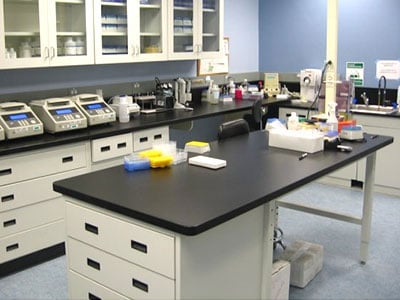Solid surface countertops are a type of work surface that is commonly found in industrial settings because of their versatility and durability.
They have an excellent reputation as a strong, dependable and attractive countertop in many environments, but whether they are right for your workspace comes down to your application and budget.
Below we’ll explore the question, What are solid surface countertops? and dive into some of the features that make this work surface unique.
Solid Surface Composition
To understand what makes this work surface so attractive for many laboratories and industrial workspaces, you have to begin with its composition.
What are solid surface countertops made of?
Solid surface countertops contain a non-porous, homogeneous material that consists of the same composition throughout. Solid surface is similar to plastic in that it is usually made from a resin and features a filler material. The end result is around 66% minerals and 33% binding resins. 
Resin materials can vary from acrylic to polyester and plastic. The mineral portion often depends on what the client envisions for the countertop’s final look. Minerals may include marble and granite that give the countertop a high-end look.
The mineral portion also typically includes aluminum trihydrate (ath). This is a fine white powder that gives solid surface countertops their smooth appearance.
How Solid Surface Countertops Are Made
When manufacturers make solid surface countertops, they mix the minerals and binding resins with a powdered filler and pigments.
These fillers and pigments play an important role in creating a unique look that can mimic the appearance of granite, marble and stone. Pigments provide customized colors that allow you to choose color schemes for their workspaces.
After the mixture chemically cures, workers heat it to 140 degrees F. This forms a solid material that designers can customize to a specific size and shape. If your application requires that your solid surface counters must withstand a greater level of heat, manufacturers can heat the countertops to around 320 degrees F to improve their resistance.
Solid Surface Customizations
One of the greatest advantages of solid surface countertops is that it can come in a variety of colors and patterns.
As we mentioned above, manufacturers can design solid surface countertops to take on the appearance of granite, marble and stone. Below are a few other options for customization:
- Finishes: Gel coating, gloss, matte and textured appearances
- Colors: A palette of options, from beige hues to warm golds, rich blues and vibrant reds
- Uses: Countertops, as well as can be molded to create sinks, backsplashes and other fixtures found in manufacturing and laboratory spaces
Manufacturers may also provide a wide assortment of edge treatments and inlays that create customized looks.
Are Solid Surface Countertops Right For Your Workspace?
While the ability to customize the look of your solid surface countertops makes this type of work surface an attractive choice for many lab managers, it’s important to determine whether it’s the right fit overall.
Like any material, solid surface materials offer advantages and disadvantages.
Advantages
- Invisible seams, so several pieces can be molded to fit perfectly together and used across a large area of countertop space
- Customized look, featuring vibrant colors, patterns and edging
- Non-porous surface, which keeps bacteria, mildew and stains away
- High impact resistance due to its homogeneous makeup, allowing this material to fare better than multi-layered countertops like laminate
- Easy maintenance, since solid surface countertops do not require extensive care for cleaning (often only soap and water or a mild cleaner)
- Easy to repair when minor damage occurs (can be easily fixed by sanding the damaged area with sandpaper or an orbital sander)
Disadvantages
- Doesn’t offer the same level of resistance to harsh conditions, compared to other countertops like phenolic resin and epoxy resin
- Not heat resistant, so they may discolor or crack when they come in contact with open flames and other heat sources
- More prone to scratches, since this material is softer than others like epoxy resin
- Higher level of care is required in some cases, such as for cleaning glossy finishes
- May show imperfections more when you choose a natural stone finish versus a color finish since the color pigment goes through the entire surface
- Polyester-based surfaces are more fragile, which can make it difficult to achieve a seamless solid seam
There’s also the issue of cost that can be an advantage or disadvantage depending on your budget. In fact, one of the biggest driving factors in whether a material is right for your lab is the price, which begs the question, How much do solid surface countertops cost?
That answer depends on a number of factors, although in general, the cost of solid surface countertops can range anywhere between $50 and $200 per square foot. Factors that can influence cost include:
- The level of heat resistance required for your workspace
- Pigments and fillers added
- Special finishes, like high gloss or textures
- Edging finishes like French cove or beveled
- Added features such as sinks or backsplashes
- Size and shape of the countertop
The composition of your solid surface countertop can also impact the cost. For example, polyester is typically more inexpensive than acrylic resin.
So are solid surface countertops the best choice? If your workspace is in a high moisture environment, this material can be a great choice since its non-porous surface keeps mildew, bacteria and stains away. Its seamless look also provides an attractive workspace.
If your lab regularly uses harsh chemicals, high heat or special tools, you may find more advantages to purchasing other materials like phenolic resin, epoxy resin or chemical laminate.
You can read more about some of these alternatives to solid surface countertops in our article, Top 5 Materials To Consider For Your Lab Countertops.


